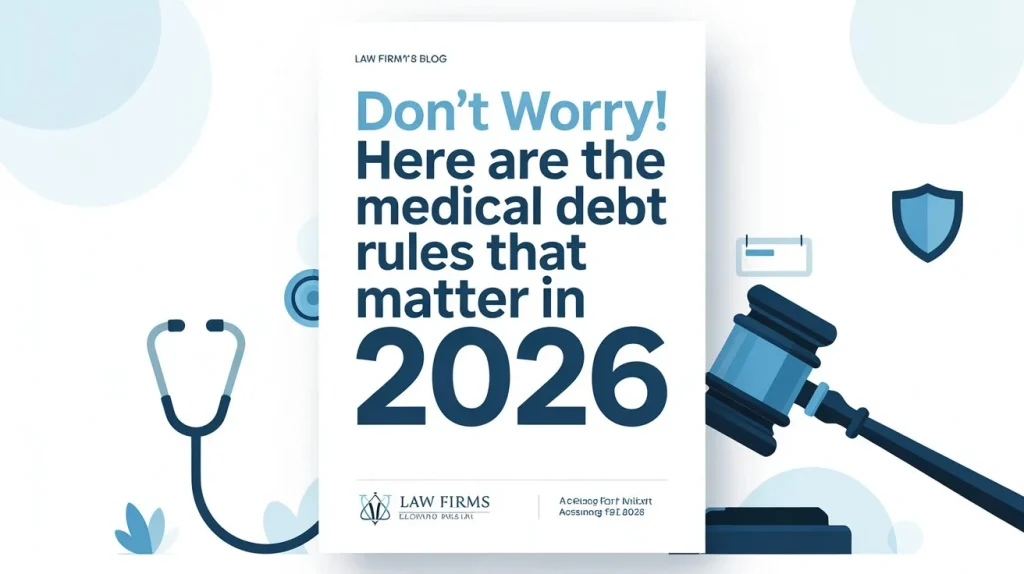Bureau of Medical Economics Phone Harassment?
Is the Bureau of Medical Economics (BME) calling you repeatedly?
Are they demanding payment for a medical bill, threatening legal action, or calling multiple times a day? Have they contacted your family, employer, or neighbors about a medical debt?
If so, those actions may be illegal.
You have the legal right to stop Bureau of Medical Economics phone harassment. When a debt collection agency violates federal consumer protection laws, consumers may be eligible to recover up to $1,000 in statutory damages, plus attorney fees.
Updated for 2026
Medical debt collection continues to be one of the most complained-about categories in the U.S. Consumers frequently report issues involving incorrect billing, identity errors, failure to validate debts, and improper credit reporting. Regulatory scrutiny around medical debt collection practices remains high, particularly when disputes are ignored or collections are inaccurately reported.
What Actually is Medical Debt Collection?
Medical debt collection works differently than other types of consumer debt.
Healthcare providers often outsource unpaid patient balances to third-party collection agencies like the Bureau of Medical Economics. These agencies are typically paid a percentage of what they successfully recover, which can sometimes lead to aggressive collection behavior.
Medical debt can affect:
-
Your credit report
-
Your ability to qualify for loans or housing
-
Your peace of mind if calls become excessive or abusive
Understanding your rights is critical before responding to any collection attempt.
Who Is the Bureau of Medical Economics?
The Bureau of Medical Economics (BME) is a third-party medical debt collection agency based in Phoenix, Arizona. The company primarily focuses on collecting unpaid healthcare-related balances on behalf of medical providers.
Company Information
| Detail | Information |
|---|---|
| Company Name | Bureau of Medical Economics |
| Industry | Medical debt collection |
| Location | Phoenix, Arizona |
| Address | PO Box 20247, Phoenix, AZ 85036-0247 |
| Phone | (602) 252-3469 |
BME has been operating for several decades and has appeared in federal court records related to consumer disputes.
Is the Bureau of Medical Economics a Scam?
No, BME is a real debt collection company, but that does not mean every collection attempt is lawful.
🔗 Bureau of Medical Economics Better Business Bureau
According to publicly available records:
-
BME has been in business for over 60 years
-
The Better Business Bureau does not accredit the company.
-
Consumers have filed dozens of complaints, many related to billing disputes and communication issues
Longevity does not eliminate a consumer’s rights. Even legitimate debt collectors must follow the law.
Medical Debt Rules That Matter in 2026

Medical debt receives special treatment under modern credit reporting standards.
| Medical Debt Rule (2026) | What It Means for Consumers |
|---|---|
| Medical debt under $500 | Generally not reported to credit bureaus |
| Paid medical collections | Must be removed from credit reports |
| Disputed medical debt | Cannot be reported while under review |
| Validation notice | Must be sent within 5 days of first contact |
| Identity theft claims | Collection activity must pause |
These protections apply even when the debt is legitimate.
Bureau of Medical Economics Collection Tactics

If BME engages in any of the following behaviors, your rights may have been violated:
| Collection Practice | Legal Status |
|---|---|
| Failing to provide debt validation | Not allowed |
| Ignoring a written dispute | Not allowed |
| Calling excessively or repeatedly | May be illegal |
| Discussing debt with third parties | Not allowed |
| Reporting disputed medical debt | Restricted |
| Calling outside permitted hours | Not allowed |
Medical debt collectors must follow federal consumer protection standards at all times.
Known Bureau of Medical Economics Phone Numbers
Are you receiving calls from any of these numbers?
☎️ 602-252-3469
☎️ (602) 252-3469
☎️ 6022523469
If yes, the calls may be from BME. The list above is not exhaustive—calls may come from other numbers and still originate from the same agency.
How Medical Debt Collection Affects Your Credit
Medical collections can still impact your credit, even in 2026.
Potential consequences include:
-
Lower credit scores if inaccurately reported
-
Delays in mortgage or rental approvals
-
Increased difficulty obtaining financing
That said, newer credit scoring models weigh medical collections less heavily, especially when they are paid or disputed.
You should regularly review your credit report to ensure:
-
Medical debts are accurate
-
Paid collections are removed
-
Disputed items are not being reported
What To Do If BME Is Calling You
If Bureau of Medical Economics is contacting you:
-
Do not admit the debt immediately
-
Check your credit report for medical collections
-
Document call frequency and behavior
Keeping records is essential if violations occur.
Consumer Rights & Oversight
Medical debt collectors are subject to federal consumer protection laws governing third-party collection activity and credit reporting practices. Consumers experiencing harassment, inaccurate reporting, or validation failures may pursue relief through appropriate legal and regulatory channels.
You do not have to tolerate abusive or misleading collection practices, even if the debt exists.
Complaints Against the Bureau of Medical Economics
The following is a sample list of complaints filed against the Bureau of Medical Economics in the past and can be found on Pacer.gov.
- 2:10-cv-01193-MHB McDonald v. BME
- 2:11-cv-01186-FJM Tanner v. Bureau of Medical Economics
- 2:12-cv-00321-GMS Lilley v. BME
- 2:12-cv-00353-DKD Garcia v. BME
- 2:13-cv-00971-ROS Young v. BME

FAQs
Q1: Is the Bureau of Medical Economics (BME) a legitimate company or a scam?
A1: BME is a legitimate debt collection agency, in business for 68 years, though not accredited by the Better Business Bureau.
Q2: Can the Bureau of Medical Economics legally harass me with phone calls?
A2: No, harassment by phone is illegal under the FDCPA; you can seek legal help and may be eligible for compensation.
Q3: What should I do if BME is calling me multiple times daily?
A3: Document the calls, request verification of the debt, and consult an attorney if harassment continues or your rights are violated.
Q4: Can the Bureau of Medical Economics garnish my wages?
A4: Yes, but only if they sue you and win a judgment in court, or if it involves federal student loan debt.
Q5: How does a BME collection account affect my credit report?
A5: Debt collections reported by BME can lower your credit score and remain on your credit report for up to seven years.
Q6: What are some common illegal tactics used by BME?
A6: Tactics include failing to notify of dispute rights, harassment, and sharing debt info with family or neighbors, which is unlawful.
Q7: What services does the Bureau of Medical Economics provide?
A7: They collect unpaid medical bills, follow up on insurance claims, and manage patient accounts on behalf of healthcare providers.
Q8: What are my rights when dealing with the Bureau of Medical Economics?
A8: The Fair Debt Collection Practices Act gives you the right to dispute debts, request proof, stop harassment, and receive fair treatment.
Q9: Can BME sue me for unpaid medical debt?
A9: Yes, they can sue you if the debt is within your state’s statute of limitations and they choose to pursue legal action.
Q10: How can I effectively communicate with BME regarding my debt?
A10: Always verify debt details, request documentation, dispute errors, document all interactions, and consider negotiating manageable repayment plans.
Consumer Rights Law Firm PLLC
Consumer Rights Law Firm PLLC is a law firm that specializes in helping clients who are facing harassment from debt collectors in any form, including telephone communication. Rather than suffer alone, contact our office to begin the process to stop the Bureau of Medical Economics’ harassment. Our office has been assisting consumers since 2010. We have an A+ rating with the Better Business Bureau.
If you are interested in learning more about how to safeguard yourself and prevent harassment from the Bureau of Medical Economics. Call us for immediate assistance or visit our website.
Contact the Florida Attorney General now:
Success Stories
- This firm will not disappoint! Scott does not sleep, I’m convinced of it. You can text/call about the issues you’re facing and you will always get a quick response. They’re handling multiple cases with resolutions for me already. I was afraid to try thinking nothing would come of it or an attorney trying to sell pipe dreams, I was wrong. This is the one to try. They will stop the harassment.
- I cannot thank this lawfirm enough for relieving the burden off of my shoulders. Matthew was absolutely amazing and all I had to do was make a singular call and he got it done immediately. Their professionalism and dedication were the key factors of my immediate trust with them.
- I can’t believe how friendly and fast Matt acted on my behalf. The collection calls stopped quickly and my debit for that card is GONE. The firm got the card company to forgive my balance and even pay their fees. I didn’t have to pay anything. The best call I could have made. Thank you







